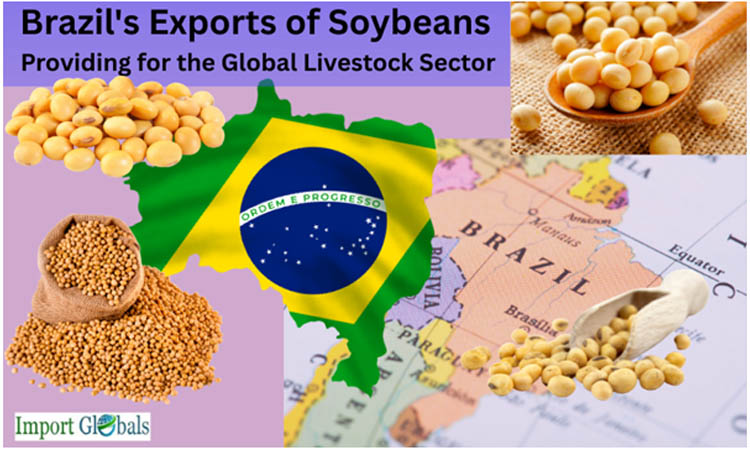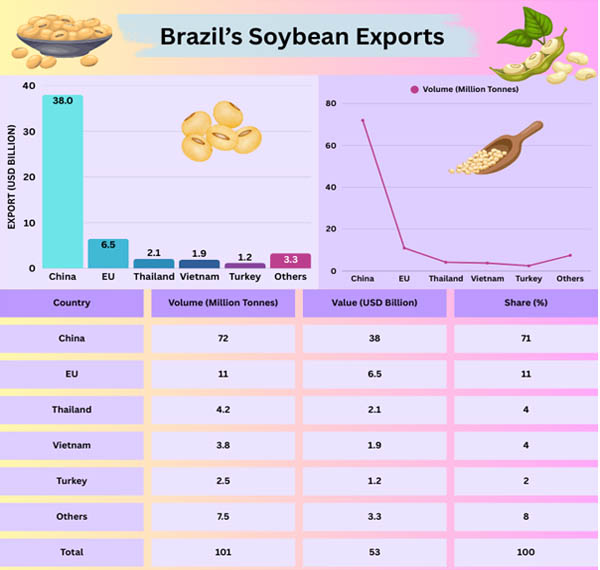
- Sep 23, 2025
Brazil's Exports of Soybeans: Providing for the Global Livestock Sector
Soybeans have emerged as the nation's most valuable agricultural product because of their rich soil, ideal climate, and robust demand from foreign markets. In addition to being used for human consumption, soybeans are essential to the global livestock business, especially as a main component of animal feed.
China Import Data speaks volumes. China has emerged as the world's most significant consumer of soybeans, while Brazil has overtaken the US as the world's top exporter in recent years. In addition to supporting Brazil's economy, this supremacy is essential to the world's food security and the supply chain for cattle.
Brazil's Dominance in Soybean Exports
In 2023, Brazil exported around 101 million tons of soybeans, worth about USD 53 billion. This demonstrated the nation's significance in global markets by accounting for about 50% of the world's soybean commerce. Brazil Import Trade Statistics by Import Globals states that Government incentives, infrastructural upgrades, and a huge network of farms all help the sector.
Brazil's main agricultural export, accounting for around 14% of total export earnings, is soybeans. Additionally, the industry sustains millions of jobs in trade, shipping, logistics, and rural farming areas. Brazil Import Export Trade Analysis finds that Brazil's advantage is its capacity to steadily increase the amount of area under cultivation, especially in states that are the center of soybean growing, such as Mato Grosso, Goiás, and Paraná.
Crucial Export Destinations
With around 70% of all exports, China continues to be Brazil's top market for soybeans. Imported soybeans are a major source of feed for the expanding livestock and poultry sectors of the Asian behemoth. Thailand Import Data by Import Globals states that the European Union, Thailand, Vietnam, and Turkey are among the other major purchasers; they all import soybeans to support their own livestock and food processing industries.

The Livestock Industry and Soybeans
Brazil Export Data finds that because they are processed into soybean meal, a protein-rich product necessary for animal feed, soybeans play a major role in the worldwide livestock sector. Approximately 80% of the soybeans produced globally are used as animal feed.
Brazil's exports directly support the production of meat in nations like China, where growing incomes have increased demand for meat. As per Brazil Export Import Global Trade Data, Brazilian soybeans are a secret force behind the trends in meat consumption worldwide. The crop's broad influence is further demonstrated by the indirect assistance it provides to sectors like dairy and aquaculture.
Strategic and Economic Significance
Brazil's soybean exports are a strategic economic advantage rather than only an agricultural accomplishment. Brazil's currency is strengthened, its trade surplus is balanced, and expenditures in social programs and infrastructure are financed by the country's soybean trade. Brazilian soybeans offer importing nations a dependable and reasonably priced feedstock source, guaranteeing food security and steady supply chains for meat.
China Import Trade Analysis by Import Globals states that Brazil and China's trading connection is very important. A major component of bilateral economic relations, soybeans make up around 40% of Brazil's total exports to China. The geopolitical significance of soybean exports in determining Brazil's global influence is shown by this dependency.
Concerns with Brazil's Exports of Soybeans
Brazil's soybean sector confronts several obstacles despite its dominance:
- Environmental Problems: Global worries about deforestation, biodiversity loss, and climate change have been heightened by the expansion of soybean fields into the Amazon and Cerrado biomes.
- Infrastructure Bottlenecks: Despite improvements to Brazil's roadways and ports, inefficient transportation still raises prices and lowers competitiveness.
- Global trade Tensions: As per China Import Custom Data by Import Globals, given Brazil's dependence on China, changes in trade laws, tariffs, or geopolitical conflicts may cause supply chains to break down.
- Pressures on Sustainability: As a result of growing demand from foreign importers and consumers for soybeans certified as deforestation-free, Brazil is being pressured to implement more sustainable methods.
Prospects for the Future
Due to expanding animal industries, dietary changes toward more protein, and growing populations, the demand for soybeans is predicted to continue rising globally. With shipments expected to surpass 105 million tons by 2025, Brazil Import Export Trade Data by Import Globals indicates that it is expected to continue to hold its dominant position. Brazil will need to make investments in logistical infrastructure, export market diversification, and sustainable farming to maintain its supremacy while juggling its environmental obligations.
Conclusion
Brazil’s soybean exports are the backbone of the global livestock industry, underpinning meat and dairy production worldwide. By supplying nearly half of the world’s soybeans, Brazil not only drives its own economy but also supports food security across continents. However, balancing export growth with environmental sustainability will be the defining challenge in the years ahead. As demand for protein-rich diets continues to grow, Brazilian soybeans will remain at the heart of global agriculture and trade. Import Globals is a leading data provider of Brazil import export trade data. Subscribe to Import Globals to get more details on global trade!
FAQs
Que. Why are Brazilian soybeans important for the world’s livestock industry?
Ans. Brazilian soybeans are processed into protein-rich soybean meal, a critical component of livestock feed for poultry, pigs, and cattle worldwide.
Que. Which country is the largest buyer of Brazil’s soybeans?
Ans. China is the largest buyer, accounting for about 70% of Brazil’s total soybean exports.
Que. What challenges does Brazil face in expanding soybean exports?
Ans. Key challenges include deforestation concerns, infrastructure bottlenecks, global trade tensions, and sustainability pressures from buyers.
Que. How much soy does Brazil export annually?
Ans. In 2023, Brazil exported approximately 101 million tonnes of soybeans, valued at around USD 53 billion.
Que. Where can you obtain detailed Brazil Export Data?
Ans. Visit www.importglobals.com or email info@importglobals.com for more information on up-to-date data.
